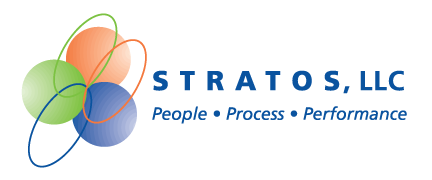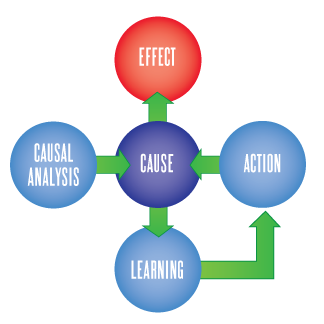
THE STRATOS CAUSALLY REASONED INVESTIGATION METHOD
Problem solving takes many forms in modern business and industry. The ability to successfully resolve problems of unwanted or poor performance is a critical measure of success for an organization. A wide range of methods have been developed to analyze and resolve performance issues, but these methods vary greatly in their reasoning, techniques and outcomes. The differences in these methods can be most clearly seen in that most critical form of problem solving: investigations.
 Many problems in manufacturing environments entail significant economic and human impact coupled with a high level of causal complexity. Problems that contain high complexity require a high level of reasoning to successfully identify the causes and to develop corrective action. The Stratos Causally Reasoned Investigation Method was developed specifically to address these challenging problems. The Stratos Method is a collection of analytical tools and leadership techniques intended to help organizations improve future performance by enabling managers and their staff to understand and address the causes of current unwanted or poor performance.
Many problems in manufacturing environments entail significant economic and human impact coupled with a high level of causal complexity. Problems that contain high complexity require a high level of reasoning to successfully identify the causes and to develop corrective action. The Stratos Causally Reasoned Investigation Method was developed specifically to address these challenging problems. The Stratos Method is a collection of analytical tools and leadership techniques intended to help organizations improve future performance by enabling managers and their staff to understand and address the causes of current unwanted or poor performance.
The Stratos method is implemented in three distinct phases centered on cause:
1. Causal analysis, learning and action.
2. Causal analysis is used discover the causes of an unwanted effect.
3. Learning is derived from those causes.
Action is drawn from that learning to eliminate the causes and shift the effect.
The Stratos Method has improved performance by combining the following five concepts:
- True Causality – The Stratos Method recognizes that unwanted outcomes can only have been caused by what was true and present at the time that the performance outcomes were caused. The method uses rigorous causal reasoning to identify the conditions and actions that combined to create a specific unwanted outcome. This approach seeks to avoid the typical hindsight bias that confuses what we believe should have happened or wished had happened with the actual causes.
- Systemic Depth – The Stratos Method also enables the discovery of causal depth. It applies the same rigorous causal reasoning to look beyond the immediate physical causes to discover the deeper human and system causes of an event or outcome. Developing an understanding of the underlying system that creates performance enables more profound learning and more effective action. The method makes use of recent research in system reasoning.
- Cause Based Learning – Finding the causes of unwanted performance, even at the system level, is by itself not enough to enable performance improvement. An organization must also take the time to learn from that discovery. Learning in this work implies a shift in perspective or belief from what we thought would cause the performance we wanted to a realization that it actually caused something different. The Stratos Method provides a Learning Capture Tool to record individual learning shifts, share those shifts and develop new insights from the actual causes of a problem or incident.
- Cause Based Action – To improve performance an organization has to find the causes of the unwanted current performance, learn how those causes were in place despite organizational efforts to create a different outcome and then take action that sustainably shifts or eliminates those causes. The Stratos Method provides the concepts and tools for organizations to identify the causes that must be addressed and to create corrective actions that complete that performance shift.
- Performance Leadership – Leadership plays essential roles in every phase of the Stratos Method. Incidents occur despite the best efforts of individuals and organizations to prevent them. To find the causes of those incidents requires leaders willing to create the conditions in the investigation effort that enables the staff to reveal the real causes. To learn from the causes requires leaders willing to see and address their role in the underlying causal system. To correct the causes in a way that can improve performance requires leaders willing to stay the course in an effort to shift their system to produce the outcomes wanted instead.
